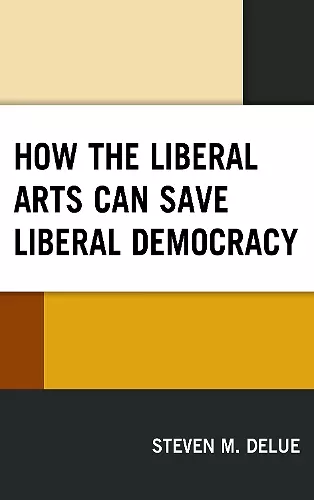How the Liberal Arts Can Save Liberal Democracy
Format:Paperback
Publisher:Bloomsbury Publishing PLC
Published:13th Aug '20
Currently unavailable, and unfortunately no date known when it will be back

Currently, liberal democracy is threatened by authoritarian movements, not just in the United States but also in societies around the world. The liberal arts arrests authoritarian tendencies by advancing what it shares with the citizens of a liberal democracy: autonomy and freedom. Autonomy is the capacity to make reasoned decisions about a host of political, social, and personal matters—independent of external parties who seek to control our lives for the sake of their ends and at the cost of our freedom. But autonomy depends on people being able to enter into discussions—what I call discourses of mutual respect—designed to test ideas in public against facts and good reasons. This discourse is facilitated by an enlarged culture through which individuals identify what they hold in common and by which individuals work to understand their differences. Now, authoritarian regimes reject autonomy because it empowers citizens to designate the boundaries and content of political authority. Liberal democracies, in contrast, embrace autonomy because it is the basis for the political institutions that provide civic equality—and through it—the freedom of citizens to control their destiny. Yet, ironically, an enlarged culture and the discourse of mutual respect that, together, sustain autonomy are not likely to be produced within a highly partisan political atmosphere of a liberal democracy. Still, a liberal democracy is open to the importation of these elements from the liberal arts. Thus, saving liberal democracy from authoritarianism depends on a robust liberal arts presence in society. What reforms of the liberal arts are needed to make this objective possible? Much rides on the answer to this question. For the fact is that if the liberal arts recedes to a whisper, liberal democracy is likely to be defeated by the authoritarian’s bluster-filled and always nihilist roar.
Delue (Miami Univ.) uses his grounding in political science and philosophy to defend his thesis. Given the current attacks on liberal arts education and the rise of right-wing authoritarian populism, this is a timely undertaking. For Delue, the liberal arts are important to liberal democracy because they share the core values of autonomy and freedom. Judgments are based on individual decisions, not “third parties” that demand support. The liberal arts (including science) call for testing ideas in public and moving past toleration of diversity to mutual respect. The highly partisan political climate in the US is certainly not conducive to mutual respect. Delue’s interpretations of the works of philosophers from the Greeks to the Enlightenment to John Rawls are interesting. The discussion of Philip Roth’s American Pastoral. . . is an outstanding example of how a work in the humanities can help readers understand contemporary politics and culture.
Summing Up: Recommended. Upper-division undergraduates through faculty.
DeLue argues that in these dark times when the the politics of resentment denies a discourse of mutual respect a place in the political sphere, the liberal arts can preserve that discourse and the “enlarged culture” it promotes. Grounded in careful readings of Plato, Kant, Rawls and Philip Roth, among others, and taking up questions about Enlightenment discourse and identity politics, the effects of social media, and the ways universities lose sight of their core mission, this is a synthetic, ultimately hopeful work that makes a persuasive case about the essential relationship between the liberal arts and liberal democracy. -- Keith Tuma, professor of English at Miami University, editor of Miami University P
ISBN: 9781498575386
Dimensions: 227mm x 154mm x 22mm
Weight: 440g
294 pages